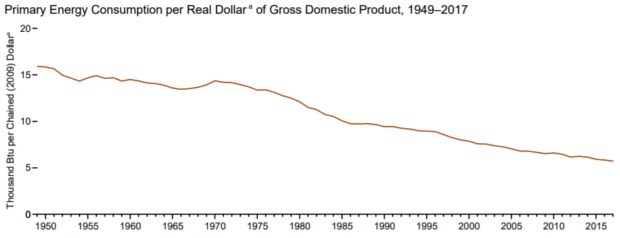While CO2 emissions rise in Europe, the U.S. leads the world in cuts for the ninth time this century
Last week, economist Jeffrey Sachs had an op-ed on CNN titled ‘Trump’s failure to fight climate change is a crime against humanity’. Sachs didn’t hold back in his opening paragraph
President Donald Trump, Florida Gov. Rick Scott, Florida Sen. Marco Rubio, and others who oppose action to address human-induced climate change should be held accountable for climate crimes against humanity. They are the authors and agents of systematic policies that deny basic human rights to their own citizens and people around the world, including the rights to life, health, and property. These politicians have blood on their hands, and the death toll continues to rise.
Strong stuff. Reading it, one can only assume that, under the Trump administration, carbon emissions from the US have skyrocketed.
But they haven’t. In fact, new data from the Environmental Protection Agency show that greenhouse gas emissions continued to plummet during President Trump’s first year in office.
Based on data from more than 8,000 large facilities, EPA found greenhouse gas emissions, mostly carbon dioxide, fell 2.7 percent from 2016 to 2017. Emissions from large power plants fell 4.5 percent from 2016 levels, according to EPA.
…
Earlier this year, the Energy Information Administration reported that per-capita greenhouse gas emissions hit a 67-year low during Trump’s first year in office.
Source: U.S. Energy Information Administration
EPA’s new data comes on news that, globally, greenhouse gas emissions are set to rise to historic highs by the end of the year, despite nearly 200 countries signing the Paris climate accord. Global greenhouse gas emissions also rose in 2017.
China, unsurprisingly, is a major culprit. But there is bad news from Europe as well.
A recent report from the Climate Action Network Europe found that emissions cuts among most European Union members were “nowhere close enough” to meet the goals of the Paris accord. Trump pledged to withdraw from the Paris accord at the earliest possibility, in 2020.
On the flip side, the U.S. led the world in emissions cuts for the ninth time this century, according to the oil giant BP’s annual energy statistics. BP reported that European Union “emissions were also up (1.5%) with just Spain accounting for 44% of the increase.
German and French emissions increased 0.1 and 2 percent, respectively, last year, BP reported, while the “UK and Denmark reported the lowest carbon emissions in their history.”
Long held up as a poster child for fighting global warming, Germany is on track to miss its 2020 emissions targets. The government will likely instead push its goal of cutting CO2 emissions back to 2030.
It is a shame that Sachs – an excellent economist – should have ignored this data in favor of penning a dreary screed partisan screed about “the fossil-fuel industry, which fill Republican party campaign coffers”.
In Sachs’ eyes, Trump’s real crime is revealing that the solution to CO2 emissions is not government commands. When he says that President Trump etc “oppose action to address human-induced climate change”, Sachs is making the same elementary error as did the socialists Frédéric Bastiat wrote about in the 19th century; to paraphrase, We disapprove of the state ordering us to reduce carbon emissions. Then they say that we are opposed to reduced carbon emissions.
The key word there is ‘state’. But continuing falls in CO2 emissions under the administration that withdrew from the Paris climate accord show that the state might not be needed. Is it possible that, seeing a problem, private businesses and individuals will work to mitigate its consequences without the government ordering them to?
John Phelan is an economist at the Center of the American Experiment.
